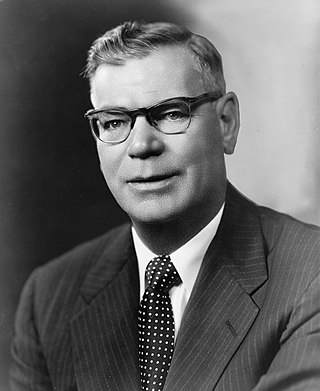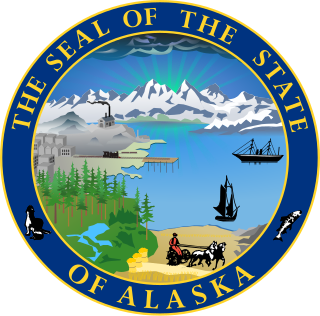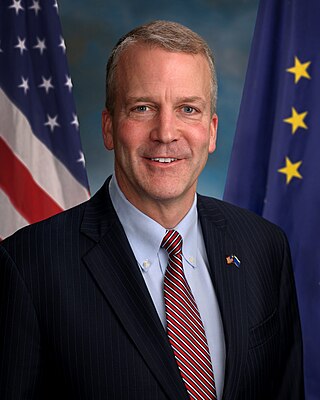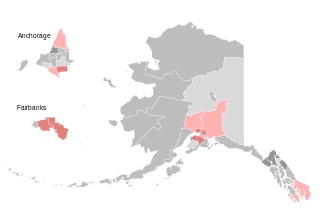
Edward Lewis "Bob" Bartlett, was an American politician and a member of the Democratic Party. He served as a U.S. Senator. A key fighter for Alaska statehood, Bartlett served as the Secretary of Alaska Territory from 1939 to 1945, in Congress from 1945 to 1959 as a Delegate, and from 1959 until his death in 1968 as a U.S. senator. He was opposed to U.S. involvement in Vietnam, along with his fellow Senator Ernest Gruening, and also worked to warn people about the dangers of radiation. Many acts bear his name, including a major law known as the Bartlett Act, mandating handicap access in all federally-funded buildings.

The 1980 United States Senate elections were held on November 4, coinciding with Ronald Reagan's victory in the presidential election. The 34 Senate seats of Class 3 were contested in regular elections. Reagan's large margin of victory over incumbent Jimmy Carter gave a huge boost to Republican Senate candidates, allowing them to flip 12 Democratic seats and win control of the chamber for the first time since the end of the 83rd Congress in January 1955.

The 1968 United States Senate elections were elections for the United States Senate. Held on November 5, the 34 seats of Class 3 were contested in regular elections. They coincided with the presidential election of the same year. The Republicans picked up five net seats in the Senate. This saw Republicans win a Senate seat in Florida for the first time since Reconstruction.

The 1958 United States Senate elections were elections for the United States Senate which occurred in the middle of President Dwight D. Eisenhower's second term. Thirty-two seats of Class 1 were contested in regular elections, the new state of Alaska held its first Senate elections for its Class 2 and 3 seats, and two special elections were held to fill vacancies.

Mark Peter Begich is an American politician who served as a United States senator from Alaska from 2009 to 2015. A member of the Democratic Party, he served as mayor of Anchorage from 2003 to 2009.

The 2008 United States Senate election in Alaska was held on November 4, 2008. Incumbent Republican U.S. Senator and former President pro tempore Ted Stevens ran for re-election for an eighth term in the United States Senate. It was one of the ten Senate races that U.S. Senator John Ensign of Nevada, the chairman of the National Republican Senatorial Committee, predicted as being most competitive. The primaries were held on August 26, 2008. Stevens was challenged by Democratic candidate Mark Begich, the mayor of Anchorage and son of former U.S. Representative Nick Begich.

Although in its early years of statehood, Alaska was a Democratic state, since the early 1970s it has been characterized as Republican-leaning. Local political communities have often worked on issues related to land use development, fishing, tourism, and individual rights. Alaska Natives, while organized in and around their communities, have been active within the Native corporations. These have been given ownership over large tracts of land, which require stewardship. The state has an independence movement favoring a vote on secession from the United States, with the Alaskan Independence Party, but its membership has shrunk in recent decades.

The 1980 United States Senate election in Alaska was held on November 4, 1980. Incumbent Democratic United States Senator Mike Gravel ran for a third term in the United States Senate, but lost in the Democratic primary to Clark Gruening, a former state representative who was the grandson of Ernest Gruening, whom Gravel had defeated twelve years prior in an election for the same seat. Gruening later went on to lose the general election to Republican nominee Frank Murkowski, a banker.

Dennis William Egan was an American politician who was a member of the Alaska Senate representing Juneau from April 19, 2009, until January 15, 2019. A member of the Democratic Party, he previously served as the mayor of Juneau from February 13, 1995, to October 3, 2000, and was a member of the local assembly prior to that. Outside of politics, he was known for his work as a radio broadcaster, most notably for KINY, and was inducted to the Alaskan Broadcaster Association's Hall of Fame in 2001.

Mary Sattler Peltola is an American politician and former tribal judge serving as the U.S. representative from Alaska's at-large congressional district since September 2022. A member of the Democratic Party, she previously served as a judge on the Orutsararmiut Native Council's tribal court, executive director of the Kuskokwim River Inter-Tribal Fish Commission, Bethel city councilor and member of the Alaska House of Representatives.
The following table indicates the parties of elected officials in the U.S. state of Alaska:

The 2008 United States presidential election in Alaska took place on November 4, 2008, as part of the nationwide presidential election held throughout all 50 states and the District of Columbia. Voters chose 3 electors, or representatives to the Electoral College, who voted for president and vice president.

The 2014 United States Senate election in Alaska took place on November 4, 2014, to elect a member of the United States Senate to represent the State of Alaska, concurrently with the election of the governor of Alaska, as well as other elections to the United States Senate in other states and elections to the United States House of Representatives and various state and local elections.

The 2014 Alaska gubernatorial election took place on November 4, 2014, to elect the governor and lieutenant governor of Alaska, concurrently with the election of Alaska's Class II U.S. Senate seat, as well as other elections to the United States Senate in other states and elections to the United States House of Representatives and various state and local elections.

William Martin Walker is an American attorney and politician who served as the 11th governor of Alaska, from 2014 to 2018. He was the second Alaska-born governor, after William A. Egan.

The 2018 Alaska gubernatorial election took place on November 6, 2018, to elect the governor and lieutenant governor of Alaska. In the primaries for recognized political parties, candidates for governor and lieutenant governor run separately. The winners of each respective primary for governor and lieutenant governor then become a joint ticket in the general election for their political party. Incumbent Independent governor Bill Walker was seeking re-election in what was originally a three-way race between Walker, Republican former Alaska state senator Mike Dunleavy, and Democratic former Alaska U.S. Senator Mark Begich. Despite Walker dropping out on October 19, 2018 and endorsing Begich, Dunleavy won in what was the only gubernatorial gain by a Republican candidate in 2018. As of 2024, this was the last time the Governor’s office in Alaska changed partisan control. Walker later unsuccessfully ran for Governor of Alaska in 2022.

The November 2022 United States House of Representatives election in Alaska was held on Tuesday, November 8, to elect a member of the United States House of Representatives to represent the state of Alaska. Democratic incumbent Mary Peltola won reelection to a full term in office, defeating Republicans Sarah Palin and Nick Begich III and Libertarian Chris Bye in the runoff count.

The 2022 Alaska at-large congressional district special election was held on August 16 to fill the seat left vacant after the death of Republican incumbent Don Young. Mary Peltola defeated former governor Sarah Palin in the election, becoming the first Democrat to represent Alaska in the House since 1972, the first Alaska Native elected to Congress, and the first woman elected to represent Alaska in the House.

The 2022 Alaska state elections took place on November 8, 2022. The state also held Regional Educational Attendance Area (REAA) elections on the first Tuesday in October.

The 2024 United States House of Representatives election in Alaska will be held on November 5, 2024, to elect a member of the United States House of Representatives to represent the state of Alaska from its at-large congressional district. The election will coincide with the 2024 U.S. presidential election, as well as other elections to the U.S. House, elections to the United States Senate, and various other state and local elections.



















